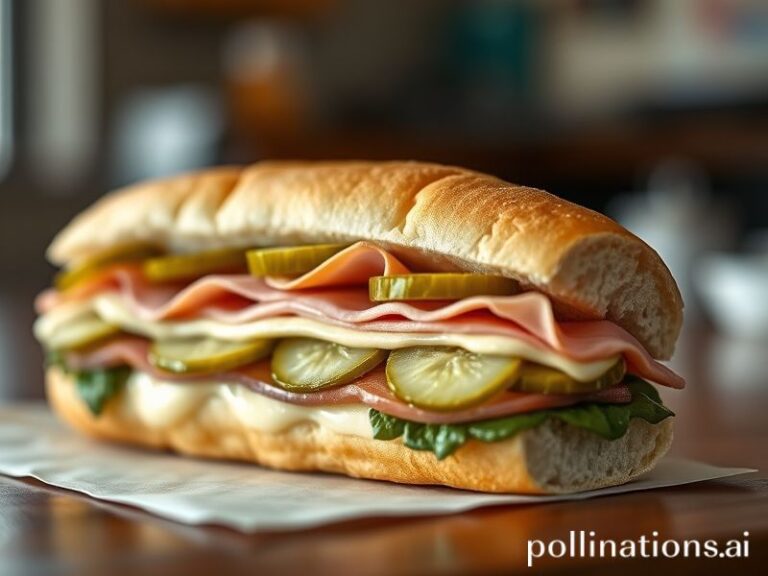Tallon Griekspoor: The Dutch Disruptor Quietly Rewriting Tennis’ Global Order
The Curious Case of Tallon Griekspoor, or How a Dutchman Became the Canary in Tennis’ Multinational Coal Mine
Dave’s Locker – International Sports Desk
If you mention the name Tallon Griekspoor in a bar on the Rue Oberkampf, the average Parisian will assume you’ve ordered a craft beer by accident. In Melbourne they’ll think it’s a new species of spider. And in Cincinnati—well, in Cincinnati they’re still arguing about the pronunciation of “Djokovic,” so let’s not hold our breath. Yet the 27-year-old from the flatlands of the Netherlands is quietly turning the men’s tennis tour into a referendum on globalization, late-capitalist burnout, and the increasingly thin line between “journeyman” and “the guy who just scalped the No. 3 seed.”
Griekspoor’s ranking—currently loitering around the top-30, depending on which algorithm you trust more than your own mother—doesn’t scream geopolitical tremor. Still, in a sport where the same three passports have hogged the silverware for the better part of two decades, any new flag in the later rounds feels like a UN Security Council seat. The Dutch, after all, are better known for speed-skating supremacy and inventing the concept of splitting the bill. Now they’re exporting a 6-foot-2 baseline metronome who apparently missed the memo that only the Balkans, Iberia, and select Swiss cantons are allowed to win majors.
What makes Griekspoor internationally interesting isn’t the power game—his serve could politely be described as “adequate”—but his capacity for bureaucratic revenge. Every upset he scores against a higher-ranked opponent is one more line item in the ledger proving that the ATP’s ranking system is about as reliable as a Russian census. For the betting syndicates in Manila, the hedge funds in Mayfair, and the streaming services in Silicon Valley that have all hedged futures on tennis’s hegemony, Griekspoor is a Dutch tulip bulb in a wheat field: beautiful, mildly threatening, and historically prone to speculative bubbles.
Off the court, his rise mirrors the gig-economy grind that now defines the tour. While Federer was busy collecting Rolexes, Griekspoor spent 2020 playing the Challenger circuit in Kazakh bio-bubbles, subsisting on airline couscous and existential dread. Ask him about the year he won five Challengers in five weeks and he’ll describe it the way war correspondents talk about Fallujah: technically survivable, not recommended for children. That experience forged a resilience perfectly calibrated for a planet where nobody’s itinerary survives contact with geopolitics—whether it’s a pandemic, a European energy crisis, or the sudden realization that your next tournament is sponsored by an authoritarian state with a side hustle in sports-washing.
The broader significance? Griekspoor is the embodiment of a post-heroic era in men’s tennis. We’ve entered the twilight of the household-name demigods; the vacuum is being filled by competent polyglots who look like they might also fix your Wi-Fi. In a world increasingly allergic to certainty, his career arc offers a refreshingly nihilistic message: work hard enough and you too can become moderately famous for losing to Carlos Alcaraz in the fourth round. It’s the sort of motivational poster that would sell briskly in Berlin co-working spaces.
Meanwhile, the Dutch government—never one to miss a branding opportunity—has begun featuring Griekspoor in soft-power campaigns aimed at convincing post-Brexit Britain that the Netherlands is more than tulips and tax loopholes. Expect a commemorative stamp series by summer; expect it to be under-printed, because even philatelists hedge their bets these days.
So when Griekspoor steps onto Court Suzanne-Lenglen this May, remember you’re not just watching a tennis match. You’re witnessing a low-stakes proxy war between national identity and global capital, fought with polyester strings and Hawkeye replays. Win or lose, the man from Haarlem will shuffle back to the locker room, politely thank the umpire in three languages, and board a budget airline like the rest of us schmucks—proof that in 2024, even athletic grace has to clear customs.







